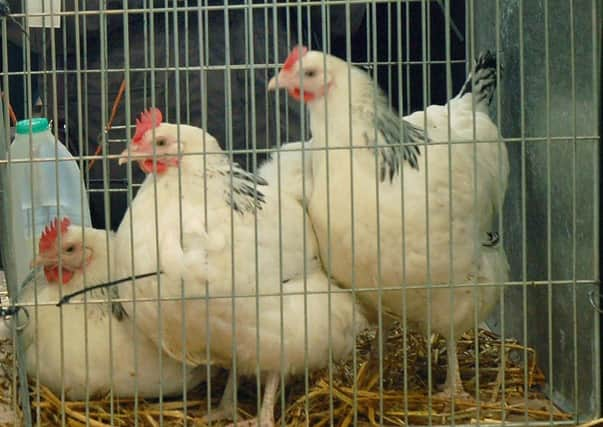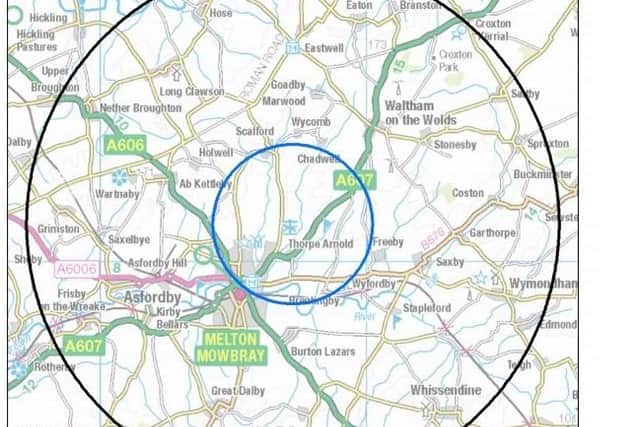Restrictions imposed after bird flu detected at Melton site


Officials at the Department for Environment, Food and Rural Affairs (DEFRA) have taken the action in a bid to limit further spread of the H5N8 strain which was detected.
A temporary control zone covering a radius of 10km zone around the affected site has been imposed where movement of domestic poultry and other captive birds is not allowed.
Advertisement
Hide AdAdvertisement
Hide AdIt also means that all birds kept by people living within the zone must be housed in enclosures which don’t allow them to fly in and out or have any contact with wild birds.


Defra declined to confirm the Melton site where the bird flu outbreak was discovered, although the BBC is reporting it is at Twinlakes Theme Park.
Chief Veterinary Officer Christine Middlemiss told the Melton Times: “Avian influenza has been confirmed in a small number of poultry and captive birds at a site near Melton Mowbray in Leicestershire.
“All of the birds at risk of having been infected will now be humanely culled and we have put a temporary control zone in place around the premises to prevent the spread of the disease.
Advertisement
Hide AdAdvertisement
Hide Ad“Following a number of confirmed cases in the UK there is currently an Avian Influenza Prevention Zone in place across the country to ensure that we can eradicate the disease as quickly as possible.
“Bird keepers should remain alert for any signs of disease, report suspected disease immediately and ensure they are maintaining strong biosecurity measures on their premises.”
The Melton outbreak is the latest reported case in England, with others detected this month in Stroud, Gloucestershire; Leominster, Herefordshire; Frodsham, Cheshire and Deal, Kent.
Gary Connors, head of regulatory services for Leicestershire County Council, said: “We are working closely with DEFRA and to help reduce the spread of the disease, our Trading Standards officers will be visiting properties within the control zone in order to identify anyone who has birds.”
Advertisement
Hide AdAdvertisement
Hide AdEarlier this month, an avian influenza prevention zone was declared across the whole of England to mitigate the risk of the disease spreading, which means that all bird keepers across the country are subject to some form of restrictions.
The prevention zone means bird keepers across the country must:
***Ensure the areas where birds are kept are unattractive to wild birds, for example by netting ponds, and by removing wild bird food sources;
***Feed and water your birds in enclosed areas to discourage wild birds;
***Minimise movement in and out of bird enclosures;
Advertisement
Hide AdAdvertisement
Hide Ad***Clean and disinfect footwear and keep areas where birds live clean and tidy;
***Reduce any existing contamination by cleansing and disinfecting concrete areas, and fencing off wet or boggy areas.
Backyard owners with smaller numbers of poultry including chickens, ducks and geese are also urged to strengthen their biosecurity measures in order to prevent further outbreaks of avian influenza in the UK.
Public Health England (PHE) advises that the risk to public health from the virus is very low and the Food Standards Agency advises that avian influenzas pose a very low food safety risk for UK consumers.
Advertisement
Hide AdAdvertisement
Hide AdProperly cooked poultry and poultry products, including eggs, are safe to eat.
Poultry keepers and members of the public should report dead wild birds to the Defra helpline on 03459 335577 and keepers should report suspicion of disease to APHA on 03000 200 301.
Keepers are asked to go online at www.gov.uk/guidance/avian-influenza-bird-flu to familiarise themselves with avian flu advice.
Fur and feather and other bird sales have not been taking place at Melton Livestock Market since the Covid pandemic began more than six months ago.